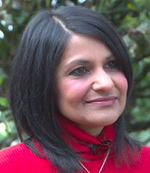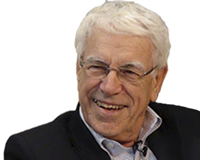The Green Interview:
Silver Donald Cameron Speaks With Mumta Ito
Mumta Ito began her career as a high-powered corporate lawyer, working in the heart of the City of London, Britain's equivalent to Wall Street. She was advising investment banks, multinational corporations and governments on large-scale, complex class actions. She was very successful until she found herself questioning the human value of her work. During a leave of absence, she experienced a profound spiritual transformation, which led her to challenge the whole relationship between human law and the laws of Nature. She founded the International Centre for Wholistic Law at Findhorn in Scotland, and is engaged in a European Citizens’ Initiative designed to change the world by embedding the rights of Mother Earth in the legal system of the twenty-eight-nation European Union. This interview by Silver Donald Cameron was recorded in January of 2014.

Mumta Ito |
Silver Donald Cameron:
What is the European Citizens’ Initiative?
Mumta Ito:
The current system of environmental law, which is pretty much based on a paradigm of Nature-as-property, restricts citizens to having to bring cases through the planning and the administrative course. So, it's very difficult for communities to protect Nature. The European Citizens’ Initiative is following the emerging paradigm that’s appearing throughout the world in countries like Ecuador and Bolivia, and in the municipalities throughout the United States, of recognizing a natural law approach to recognizing Nature’s inherent rights to thrive and to flourish. So, our Initiative is for recognizing and respecting the inherent rights of Nature.
Cameron:
What would that actually mean in practice? Let’s say I am a citizen in one of the countries in the European Union and I see some environmental outrage going on, which I’m sure it does. What can I do about it?
Ito:
Assuming that our Initiative was successful and the EU adopted a directive on the rights of Nature, there will be a time period within which each member state will have to enact laws that give effect to the principles in the directive. This would enable the ordinary citizen in a European country to invoke the rights of Nature, so it would take it outside of the property paradigm.

Silver Donald Cameron |
Cameron:
Can you think of an example of something, which you can’t now address, but would at least get its day in court if this were in place?
Ito:
Yes, for example, something like fracking: Usually you would need to show that your rights are personally affected in some sort of a way. If there were the rights of Nature, we’d be able to look at the rights of the ecosystems that would be destroyed by this, as well as the rights of the human beings involved.
Part of the mechanism that we look to build in is also to give communities the right to defend the rights of ecosystems and of Nature. At the moment, rights of communities are not really recognized in our legal system. Yes, there may be pockets where this exists, but it isn’t really a given and certainly not being able to speak up on behalf of ecosystems and biodiversity that is effected by human action.
Cameron:
Let me take you back to the beginning of all of this because one of the things that I find fascinating about your story is that it begins, in of all places, the financial heart of London; the City of London; the very belly of the beast. [Laughs] How did you get from there to Findhorn on holistic law?
Ito:
Yes, I did start out in the so-called “belly of the beast.” . . . I was a structured finance lawyer and used to represent investment banks, governments, large multinationals on very big transactions that involved several jurisdictions. On the outside, it was going very well but in my inner world something was not quite sitting right. One day I had a profound spiritual awaking and literally overnight, my worldview changed. And so, when I went back into the office, nothing there resonated with me anymore. I found that the work that I was doing was not really in alignment with what I really valued in this world.
Cameron:
What was this spiritual experience that turned this over? Because this is a fascinating situation where one day you're more or less aligned with what you’re doing, and then suddenly it’s gone completely out of harmony.
Ito:
I was raised in a fairly spiritual environment. I’d grown up practicing yoga and meditation. I’d been brought up in the spiritual traditions of my ancestors. There came a time when I wanted to turn away from that and really experience what the mainstream of life was saying was the root to happiness and this led to me pursuing the career path that I did and I pursued it wholeheartedly.
So, one day when my father wanted to go visit Mother Meera – who is an enlightened being who is residing in Germany – he invited me and my husband to come with him. I was really not very interested. At that point, I had convinced myself that there was nothing spiritual in this world, it’s just a scientific material world and that’s pretty much what life is all about, and she’s probably a fake and you know . . . it’s nothing of interest to me. However, the reason that my father was going was because my sister was actually very ill at the time and he wanted to take her for healing and my sister was refusing to go. So, my father pleaded with me and he said, “Well, if everybody comes at least I can say to your sister that it’s a family holiday and you don’t even need to come and see Mother Meera, you could just hang out.” So, I thought, okay, well I’m not interested in going to see Mother Meera but I am interested in helping my sister, so if it would be of help to her, then I will come along.
Of course, once I got there, [laughs] I couldn’t resist going to see Mother Meera… and when Mother Meera came into the room I went into a deep meditation. All of my childhood upbringing and my deep reverence for the spiritual came back to me as soon as I was in the presence of this incredible being. I received Mother Meera’s blessing, which she does in a very particular way. She works with the central channel, she says, where certain karmic codes are encoded and they appear in the form of knots. She looks directly for about six seconds into the eyes of each person and when she does that, she’s unknotting these knots within the central channel.
I came out of there and I came back to the office and it was like the show was over! [Laughter] “What am I doing here?” I thought.
Cameron:
And how did your colleagues react? Basically your body was there but you had spiritually left the building.
Ito:
Absolutely. The pain of being in that environment got more and more intense for me and one day when I was there late at night, working on a transaction, I ended up having a heart-to-heart with my boss, saying, “Why are we doing this? Why are we doing this to ourselves? What’s the end result of what we do? Some corporation or some bank just ends up making a little bit more money and what are they doing with the money and what are they solving the problems of poverty in the world? No they’re not! They’re investing it in things that sometimes can be causing damage! I don’t really know why I am doing this!”
So, my boss said, “Well, why don’t you leave?” and I said, “Well, I can't leave, because I am in this situation where we’re building a house . . . I just don't know what to do.” Something in him really heard me and he said, “Well, how about we structure it as a redundancy? Maybe I could give you say a year and half’s pay, and that would give you an opportunity to finish building your house and by then you’d discover what it is that you really want to do. Personally, I think once you’ve gone out there and seen what it’s like out there, you’ll know how good it is here and you’ll be back here.”
So, I took it. And I haven’t turned back!
To see the rest of this full one-hour interview (in video, audio or transcript), go to www.TheGreenInterview.com and sign up for a free one-week subscription. The site offers more than sixty in-depth interviews with environmental giants from around the world. Silver Donald Cameron, host and executive producer at The Green Interview, is one of Canada’s most respected authors and broadcasters. The Living Beach, his classic book on the ecology of shorelines, is published by Red Deer Press.
|

